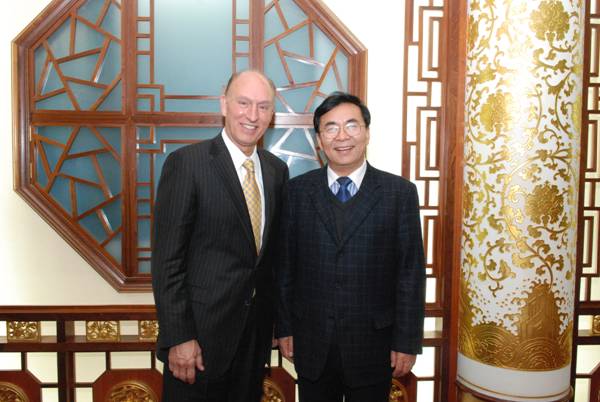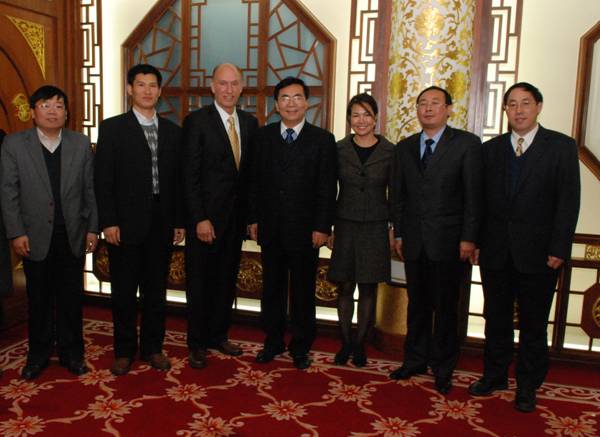Executive vice president of CAS Bai Chunli met with president of the Kavli foundation Dr. Conn
On Dec. 17, Executive vice president of CAS Bai Chunli met with new president of the Kavli Foundation Rober W.Conn and vice president of science project Dr. Miyoung Chun. Vice president of CAS Zhan Wenlong, general director of international cooperation bureau of CAS Lv Yonglong, general vice director of basic science of CAS Liu Minghua, and director of Institute of Theoretical Physics and Kavli Institute for Theoretical Physics China(KITPC) Wu Yueliang attended the meeting. Executive vice president Bai Chunli extended his warm welcome and conveyed president Lu Yongxiang’s regards to Dr.Conn for his visit, and he briefly introduced the celebration of 60th anniversary of CAS. Dr. Conn hoped to make more cooperation between CAS and the Kavli Foundation , and extended his thanks to vice president Bai Chunli as one of the member of 2007-2008 Kavli Prize committee of Nano Science attended the first ceremony of the Award of Kavli Prize.
Dr. Conn introduced what he knew from the KITPC meeting about the KITPC program development. Dr. Conn was excited about what KITPC achieved in the last two years and high praised KITPC for its running model. He said that compared to KITP Santa Barbara, KITPC had its own characteristics, and played its role very well as international platform of ITP. Dr. Chun said when she visited other Kavli institutes, she often heard people talking about KITPC, and introduced her to KIPTC’s programs. Everyone had good impression on KITPC and hoped to participate in KITPC programs. Dr. Conn said recently the Kavli Foundation focused on four scientific researches: theoretical physics, astrophysics nanoscience and neuro science and he emphasized that theoretical physics as a basic science can be easily applied to other disciplines and will play a big role in China.
Executive vice president Bai Chunli agreed with Dr. Conn and he pointed out that KITPC, as a new platform for the basic research sciences, is an international cooperation model of basic research of CAS. CAS paid high attention to the running model of KITPC, and funded KITPC for its academic activities. He hoped the Kavli Foundation can continuously support KITPC and he also hoped to increase the cooperation and contact between KITPC and other 14 Kavli institutes and strengthen the interdisciplinary cooperation especially between astrophysics, nanoscience, and even neuroscience. Actually the research group led by academician Ouyang Zhongcan of ITP had already developed a series of cooperation projects with National Center for Nanoscience and Technology.
Knowing that executive vice president Bai Chunli is a scientist on nanoscience and foreign academician of United States National Academy of Sciences, Dr. Conn said it is a great honor to a foreign scientist. When he knew that executive vice president Bai Chunli is one of the founders in China’s Scanning Probe Microscopy and made great achievements in nanoscience, Dr. Conn asked him about the developments of nanoscience. Executive vice president Bai Chunli introduced to Dr. Conn about China’s recent developments on Nanoscience, especially on the basic research, talent cultivation, and technology transfer. Executive vice president Bai Chunli also introduced to Dr. Conn the nanoscience development of China. Dr. Conn was interested about nanoscience center of CAS, and visited there in the afternoon of Dec. 18th.
Note: The Kavli Prizes recognize scientists for their seminal advances in three research areas: astrophysics, nanoscience and neuroscience, and is awarded every two years beginning in 2008. Independent of The Kavli Foundation, Kavli Prize recipients are chosen by three prize committees comprised of distinguished international scientists recommended by the Chinese Academy of Sciences, the French Academy of Sciences, the Max Planck Society, the U.S. National Academy of Sciences and The Royal Society. After making their selection for Award recipients, the recommendatons of these prize committees are confirmed by the Norwegian Academy of Science and Letters.


·